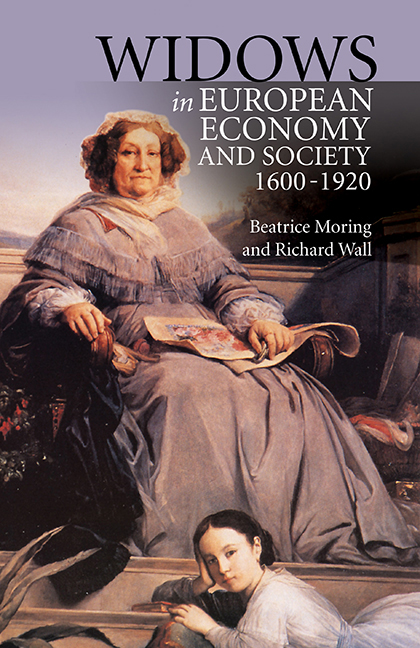Book contents
- Frontmatter
- Contents
- List of Plates
- List of Tables
- Acknowledgements
- Introduction
- 1 Widows and Poverty
- 2 Widows, Legislation and Property
- 3 Assessing the Assets of the Widow
- 4 Life Interest, Usufruct or Pension, The Mainstay of the Widow?
- 5 Urban Widows, Economy and Family
- 6 The Demography of Widowhood
- 7 Household Structure, Age, Social Status and Geography
- Conclusion
- Appendices
Conclusion
Published online by Cambridge University Press: 30 August 2017
- Frontmatter
- Contents
- List of Plates
- List of Tables
- Acknowledgements
- Introduction
- 1 Widows and Poverty
- 2 Widows, Legislation and Property
- 3 Assessing the Assets of the Widow
- 4 Life Interest, Usufruct or Pension, The Mainstay of the Widow?
- 5 Urban Widows, Economy and Family
- 6 The Demography of Widowhood
- 7 Household Structure, Age, Social Status and Geography
- Conclusion
- Appendices
Summary
THIS book started with the story of the widow Clicquot, winemaker, businesswoman, inventor of la table de remuage, but also daughter and sister of businessmen, mother and grandmother. Few widows had the family background, funds and spirit of this lady. She is, however, a living proof that widowhood did not necessarily result in withdrawal from active life, poverty, marginalisation and lack of agency. Historians have not, however, viewed widows in the past as a group exemplified by Madame Clicquot. Assumptions have been made, often based on little evidence, about the inability of widows to hold on to property or to actively engage in production to increase their assets. It would seem that, while not articulated, assumptions about ‘the weaker sex’ have formed a shadow framework to the approach of widows and widowhood in the past.
The actors in society have traditionally been seen as men; widows are part of a marginalised group identified with poverty and loneliness. The nuclear family has been considered to be the normal unit, while a widow with her children has been described as living in an incomplete family. Because of this definition of ‘normal’, female success has often been measured in the ability to marry and, in the case of the widow, to remarry. The fact that many widows did not remarry has been interpreted and defined as unsuccessful performance in the marriage market. One has to raise the question as to whether there is a tendency among males to view themselves as essential to a satisfactory life for a woman and that her choosing not to remarry will always appear incomprehensible. While it is difficult to probe the motives of individuals in the past, it would seem that, even in difficult economic circumstances, some widows chose not to remarry and rather engage in heavy manual labour to keep their children, than replace the memory of a good husband with the reality of an inferior one.
- Type
- Chapter
- Information
- Widows in European Economy and Society, 1600-1920 , pp. 249 - 260Publisher: Boydell & BrewerPrint publication year: 2017



